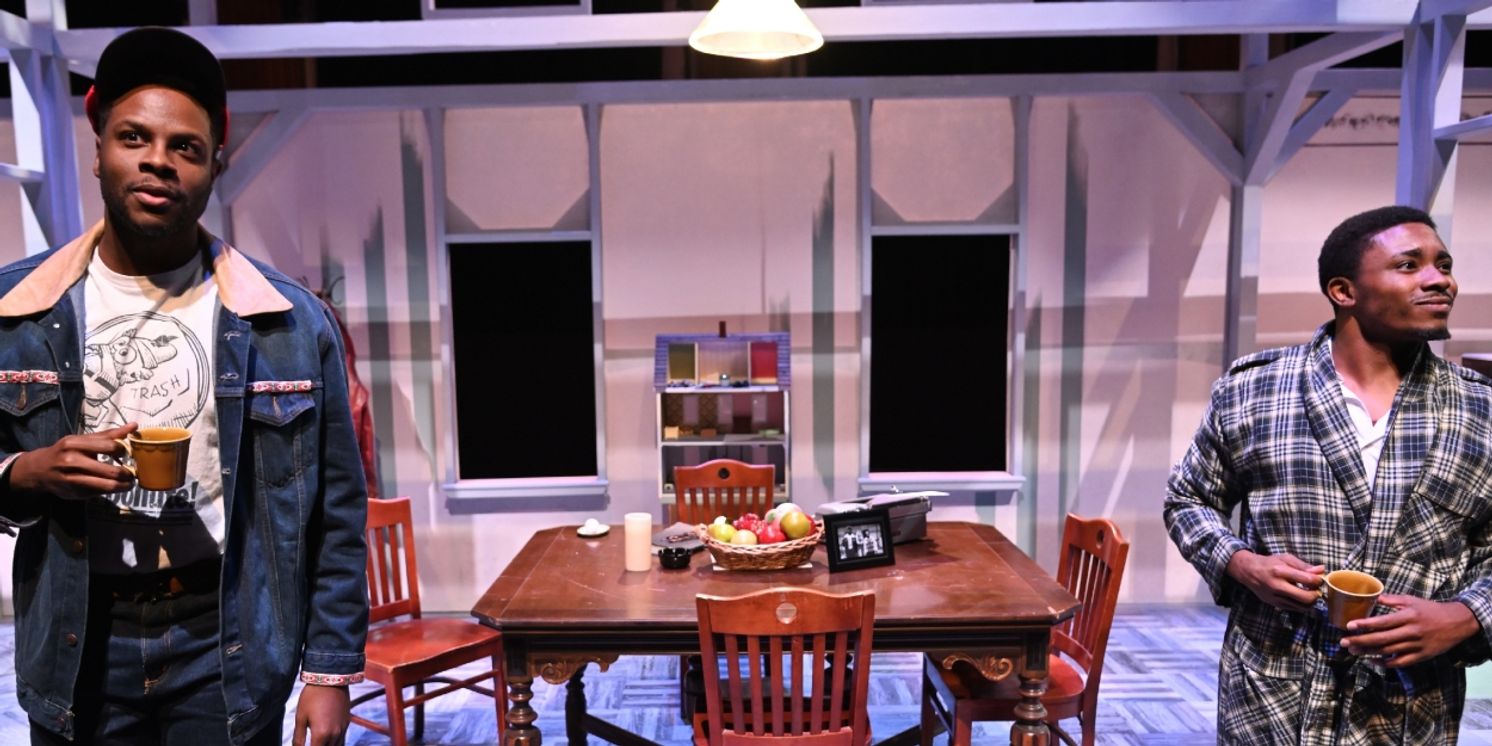Review: TRUE WEST at Brown/Trinity MFA
Great cast and innovative directorial choices refresh a Sam Shepard classic

As written—and as typically performed—Sam Shepard's 1980 dark comedy True West can feel like it skates around some of the troubling issues lurking beneath America's self image. Its vision of a dichotomous West of freedom and constraint, open range and suburb, can seem a naive gloss over questions of dislocated Native American nations and the slave labor which drove the engine of nineteenth-century progress. Not so with the keenly visualized, expertly directed, and authentically acted production at Brown/Trinity MFA. This is a brilliant take on this classic that everyone should see. Even if you don't think you like Shepard. Seriously.
For those unfamiliar, the plot revolves around two estranged brothers, Austin (a screenwriter) and Lee (a drifter), who reunite in their mother's suburban California home, only to find themselves locked in a volatile battle over identity, freedom, and art. Their mother, absent for most of the action, and Saul, a producer Austin is pitching, serve as foils, but for most of the run time, the focus is on the sibling rivalry. Lee cooks up an improbable movie Western that intrigues Saul, and the brothers' dreams begin to overlap, blur, and fray as they barrel toward a frightening confrontation.
Director Tara Moses (MFA student—as are all the cast—and citizen of the Seminole Nation) brings a clarity and authenticity that, without changing a word of the script, forces the audience to rethink fundamental assumptions. Casting the brothers as Afro-Indigenous and gender-flipping Saul is only the starting point. While theatrical companies contractually cannot change the words on the page, what they do entirely outside the confines of the script is fair game, and Moses and her production team have woven a stunning frame narrative entirely in a liminal space outside the show.
Fifteen minutes before curtain, the actor who will play Mom, Rosalyn Tavarez, appears at the front of the audience as a child playing with an ornate dollhouse in a compact and highly theatrical moment that pushes the intergenerational trauma of the script to the forefront.
The striking set design by Sara Pisheh imagines the mother's house as a series of thin structural members with integral lighting elements; it beautifully echoes the dollhouse motif. Even though Shepard, in the script, explicitly calls for a realistic set, Pisheh's design meets his higher criterion, not to "confuse the evolution of the character's situation." The set is crisp, uncluttered and evocative.
Rosalyn Tavarez plays the adult mom as a fragmented personality, delivered with an oddly haunted vagueness that is exactly the right kind of offputting. There is a virtuoso beat late in the show where she bends down to pick up her scattered dolls that is spot-on and heart-rending.
Producer Saul (Layan Elwazani) is a pitch-perfect imitation of a central-casting Sixties Hollywood producer in mannerisms, vocal inflection, and poise. Elwazani effortlessly conveys a laconic filmtown food chain alpha status that precisely rides the line between parody and reality.
Nicholas Byers as the drifter Lee delivers a genuinely scary characterization right from the top, bringing the menace of the unfenced desert into this suburban house on hobnail boots. Then Byers executes a delightful sociopathic turn on a dime when chatting up Saul—basically on one line, "Bob Hope Drive there"—it's a brilliant moment in a tour-de-force performance, which sees him descend into a frantic, flailing effort to craft the "authentic" Western narrative he has promised the producer.
His brother, the Ivy League screenwriter, is brought to life by JāqQuan Malik Jones in a crisp character study of a smooth, sweater-vested Tinseltown up-and-comer out to do lunch and make deals, before his veneer of bourgeois success is stripped away and the brothers change roles, leaving him drunkenly attempting to pull on Lee's boots, longing for the freedom of the desert. In many ways, Jones has the tougher arc. We have to believe, by the end of the show, that he is capable of violence, and we do. The way Moses visualizes the ultimate struggle—and the way Byers and and Jones execute it—is clever, keenly imagined, and overdetermined in the best way possible. No spoilers, just a word of advice: sitting in the front row house right is not recommended.
The lighting by SeifAllah Salotto-Cristobal is precise and effectively atmospheric, including the choice to allow the shadows of the skeletal set to persistently flit across the actors. And the sound design by Kathy Ruvuna provides the incessant ambient cricket background and other delightfully sharp moments of music and effects.
Is this a perfect show? No. Imaginary doors are always a problem for actors (where exactly is that knob? just how wide does it swing?) Saul's prop bag of golf clubs appears to be all woods. (Intentional meta commentary or just what was available?) And familiar viewers may wonder about some missed coyote sound cues. Yes, those are quibbles, but that's the level of minor issues this reviewer had to dig for to fill out this obligatory paragraph.
Whenever a play features a writer, you know you're entering a hall of mirrors, a conceit that Moses and Pisheh literalize and then deliberately break in the final scene. To paraphrase Audre Lorde, the master's tools may never dismantle the master's house, but sometimes, perhaps, they may be used to blast it back to plan view, encapsulate it in a dollhouse, and jiggle the player characters on almost palpable strings to rattle the walls and shake the foundations. This production aims to make just that kind of trouble—and delivers, thanks to an outstanding, brilliantly directed cast. Highly recommended.
True West by Sam Shepard, directed by Tara Moses. Brown/Trinity Rep MFA Program, at the Pell Chafee Performance Center, 87 Empire St. Providence, Nov 9 7:30pm, Nov 11 2pm and 7:30. Tickets ($7 student/$10 senior/$15 adult) available at the Trinity Rep box office and https://bit.ly/twest_mfa. CW: Adult language and themes, theatrical violence.
Photo by Mark Turek.
Reader Reviews

Videos

